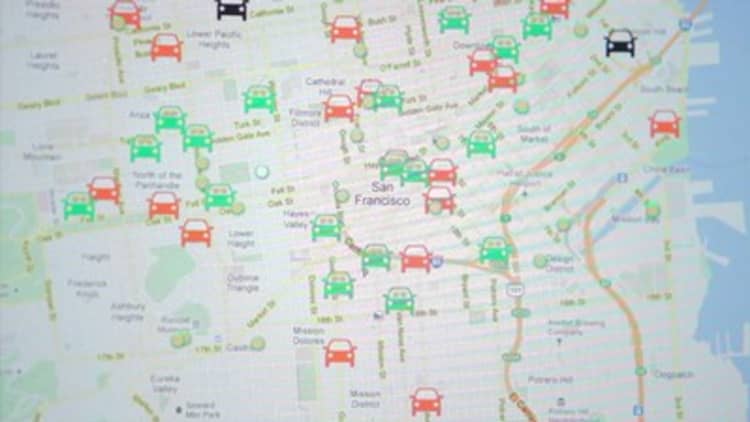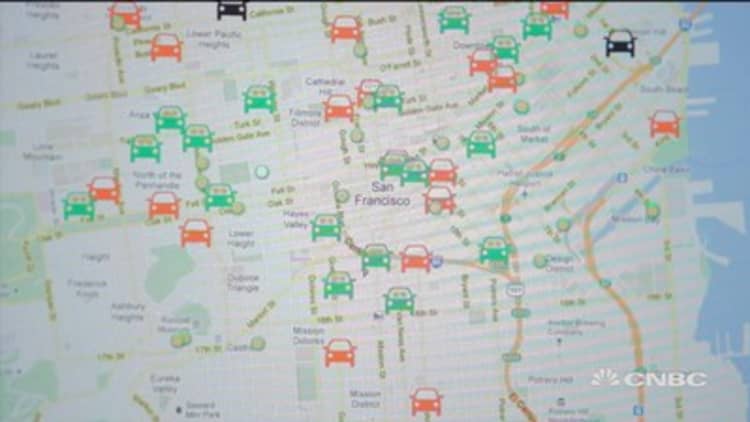
The competition is as fierce as ever in the for-hire transportation industry, as Uber and Lyft continue to put pressure on traditional taxi companies.
On Tuesday, San Francisco's largest taxi operator, Yellow Cab Cooperative, is scheduled to have its first bankruptcy hearing after the company filed for Chapter 11 protection Friday. The operator has been struggling with declining ridership and increased competition from the two big for-hire driver start-ups.
While Uber and Lyft may have contributed to increased competition for the cab cooperative, the start-ups were not the sole cause of the filing, according to the cooperative's bankruptcy attorney, Gary M. Kaplan.
"It's a business reality, there is competition there," Kaplan told CNBC. "But it's incorrect to make it sound as if this is the result of Uber and Lyft. The company operationally does fine and is still operational," he said. "It does not want to lose drivers and passengers to the competition; it wants to operate business as usual."
At the core of the bankruptcy were pending lawsuits and a recent verdict of $8 million in court, Kaplan said. The company was not covered as it was "self-insured," he added.
Uber declined to comment, and representatives from Lyft were not immediately available for comment on the Yellow Cab Cooperative's bankruptcy filing.
In recent years, more traditional taxi companies have sought bankruptcy protection as Uber and Lyft have expanded their market share in cities. In 2015, Chicago's Yellow Cab and New York taxi mogul Evgeny Freidman, who owns a fleet of New York medallions, filed for bankruptcy protection.
Such medallions, or licenses to operate New York City cabs, have dropped some 20 percent in value in recent years from their highs of more than $1 million in 2011.
The shuttering of some industry players also comes as Uber and Lyft face lawsuits over the employment status of their drivers.
Workers are now classified as independent contractors, not employees. And that's a point of contention in two separate lawsuits brought against the companies in which some drivers are suing to be reclassified as employees and be reimbursed for expenses, among other items. A recent report from Fusion found Uber has been sued 50 times alone in U.S. federal court in 2015.

As the two high-flying companies continue to raise billions of dollars among investors, old guard industries are taking notice.
GM invested $500 million in Lyft earlier in the month as part of a $1 billion fundraising, valuing the company at $5.5 billion. CNBC also reported earlier in the month that Uber is seeking capital from high-net worth clients at Merrill Lynch and Morgan Stanley, which would value the company at a previously reported $62.5 billion.
Read More Uber's latest round taps retail investors: Sources
"Uber and Lyft are driving down prices for everyone, using their access to capital," Aswath Damodaran, professor of finance at the Stern School of Business at New York University, said in an email to CNBC. "So, I guess every ride sharing business is at risk, when competing against these two."
New ride-hailing companies are a contentious issue in many cities. New York Mayor Bill de Blasio recently released a highly anticipated study on the impact of e-dispatched rides on the greater population of city drivers and passengers. The study found that while e-dispatched rides have contributed to overall congestion, Uber, Lyft and similar upstarts are "substitutions" for traditional taxi rides, not new trips.
Taxi companies broadly are reaching for new technology and riders to compete. "San Francisco's taxi industryis moving in the right direction and there is still a strong demand for taxis," said a spokesman for the San Francisco Municipal Transportation Agency, the city's taxi regulator. Taxis "are working to use technology better for street hails, and continuing our progress to make the industry as safe as possible," he said.
Read MoreIn latest battle, Uber notches win over New York City


